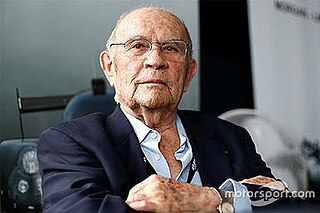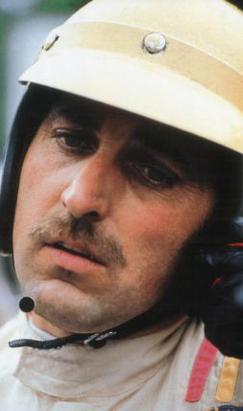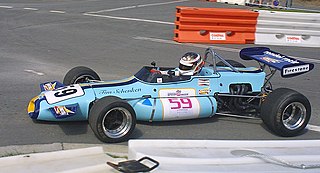Motor Racing Developments Ltd., commonly known as Brabham, was a British racing car manufacturer and Formula One racing team. It was founded in 1960 by the Australian driver Jack Brabham and the British-Australian designer Ron Tauranac. The team had a successful thirty-year history, winning four FIA Formula One Drivers' and two Constructors' World Championships, starting with two successive wins in 1966 and 1967. Jack Brabham's 1966 Drivers' Championship remains the only such achievement using a car bearing the driver's own name.

The 1968 Formula One season was the 22nd season of the FIA's Formula One motor racing. It featured the 19th World Championship of Drivers, the 11th International Cup for F1 Manufacturers, and three non-championship races open to Formula One cars. The World Championship was contested over twelve races between 1 January and 3 November 1968.

Guy Camille Ligier was a French racing driver and team owner. He maintained many varied and successful careers over the course of his life, including rugby player, butcher, racing driver and Formula One team owner.

Joseph Théodule Marie Schlesser was a French Formula One and sports car racing driver. He participated in three World Championship Grands Prix, including the 1968 French Grand Prix in which he was killed. He scored no championship points. He was the uncle of Jean-Louis Schlesser who himself became a Formula One driver in the 1980s.

The Lotus 18 was a race car designed by Colin Chapman for use by Lotus in Formula Junior, Formula Two, and Formula One, which was used from 1960 until 1966 in F1.

The Brabham BT49 is a Formula One racing car designed by South African Gordon Murray for the British Brabham team. The BT49 competed in the 1979 to 1982 Formula One World Championships and was used by Brazilian driver Nelson Piquet to win his first World Championship in 1981.

The 1967 Spanish Grand Prix was a Formula One non-championship race held at Jarama on 12 November 1967.

The Brabham BT3 is a Formula One racing car. It was the first Formula One design to be produced by Motor Racing Developments for the Brabham Racing Organisation, and debuted at the 1962 German Grand Prix. The Brabham BT3 was the vehicle with which team owner – then two-time World Champion – Jack Brabham, became the first driver ever to score World Championship points in a car bearing his own name, at the 1962 United States Grand Prix. The following year Brabham also became the first driver ever to win a Formula One race at the wheel of an eponymous car, again driving the BT3, at the 1963 Solitude Grand Prix. The BT3 design was modified only slightly to form the Tasman Series-specification Brabham BT4 cars.

The Brabham BT23 was a formula racing car built by Brabham in 1967.

The Brabham BT36 was an open-wheel Formula 2 race car, designed by Ron Tauranac, and developed and built by British racing team and constructor, Brabham, for the 1971 European Formula Two Championship. Its best result that season was a 2nd-place finish in the championship for Argentine Carlos Reutemann, despite winning only one race, taking one pole position. His consistency and pace made this possible, scoring 6 podium finishes, and finishing the season with 40 points. The Brabham BT36 was constructed out of a complex tubular space frame, and was powered by the naturally-aspirated 1.6 L (98 cu in) Ford-FVA Cosworth four-cylinder engine, which produced 220 hp (160 kW), and drove the rear wheels through a 5-speed Hewland F.T.200 manual transmission.

The Brabham BT18 was an open-wheel formula racing car, designed, developed, and built by British constructor Brabham, for both Formula 2 and Formula 3 racing categories. Powered by a Honda engine, it won 11 out of 12 races in 1966.

The Brabham BT45 was a Formula One car designed by South African engineer Gordon Murray for the 1976 Formula One season. In upgraded BT45B and BT45C form, it also competed in the 1977 and 1978 seasons.

The RAM 01, also known as the RAM March 01, is an open-wheel Formula One race car built by British team and constructor RAM Racing in 1983.

The Ligier JS2 is a mid-engined sports coupé that was built by Ligier in the French commune of Abrest near Vichy in the department of Allier between 1971 and 1975. Road-going and competition versions were built.
The Ligier JS1 is a sports-racing car that debuted in 1969 and was built by Automobiles Ligier. The car competed in various sportscar racing events during the 1969 and 1970 seasons.

The Brabham BT30 was an open-wheel Formula 2 racing car used in the 1969, 1970, and 1971 European Formula Two Championship.
The Matra MS6 was an open-wheel Formula 2 racing car, designed, developed and built by Matra in 1966.

The Brabham BT5, and its evolution, the Brabham BT8, are sports racing cars manufactured and developed by Brabham in 1963 (BT5) and 1964 (BT8), respectively. It won a total of 4 races, and achieved 10 podium finishes.

The Ferrari 125 C is an open-wheel single-seater racing car, designed, developed, and produced by Ferrari in 1947 as a single example. It competed primarily in Formula Libre contests and events.
Rodney Frederick Banting was a British racecar driver who won the 1964 BRSCC British Formula 3 Championship.
















